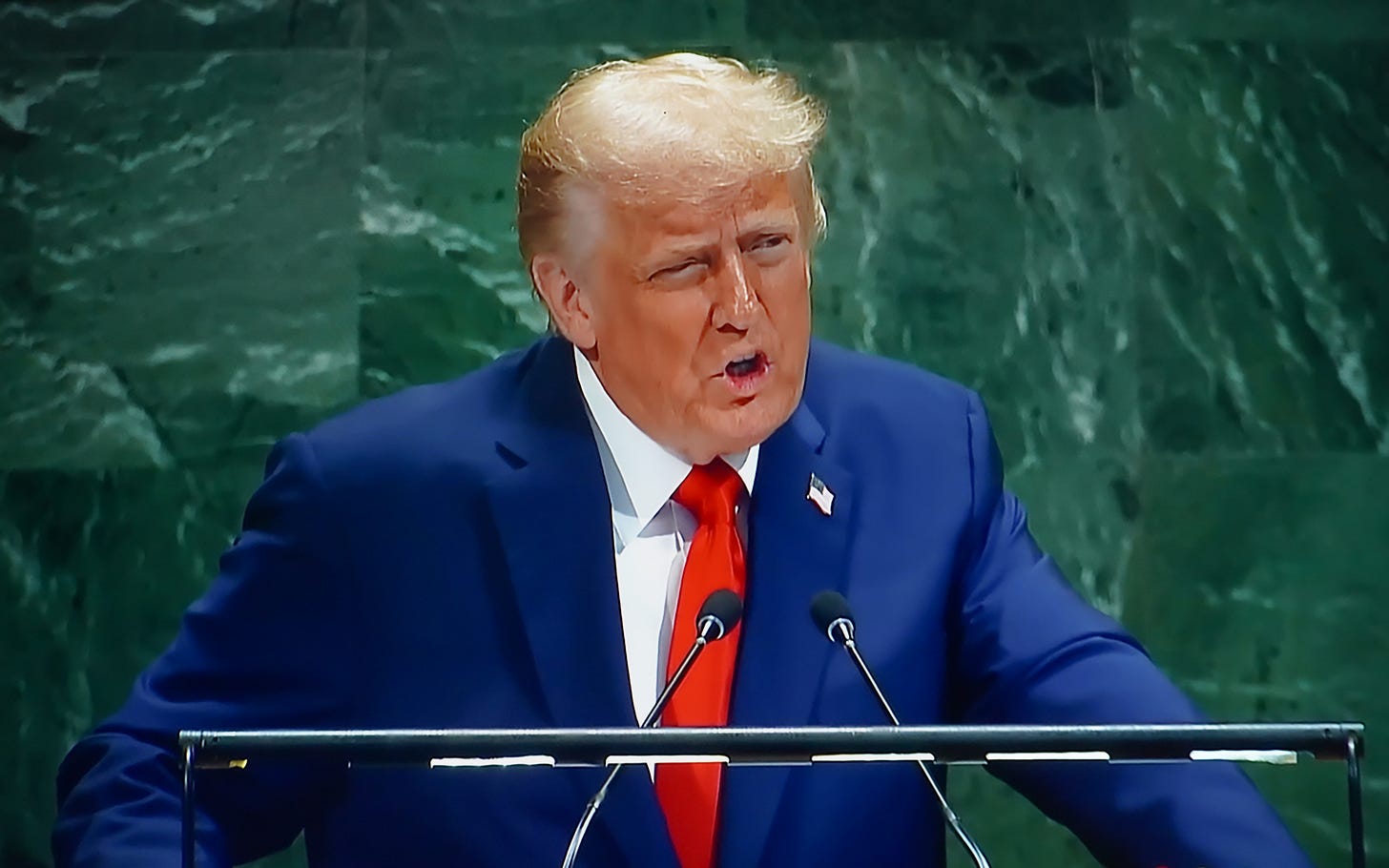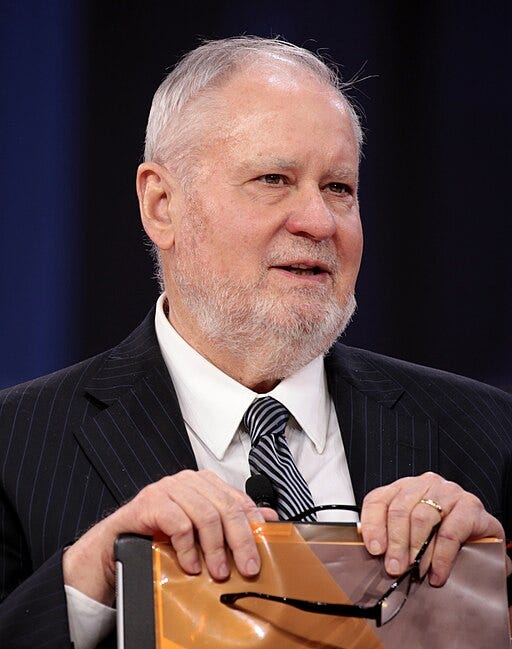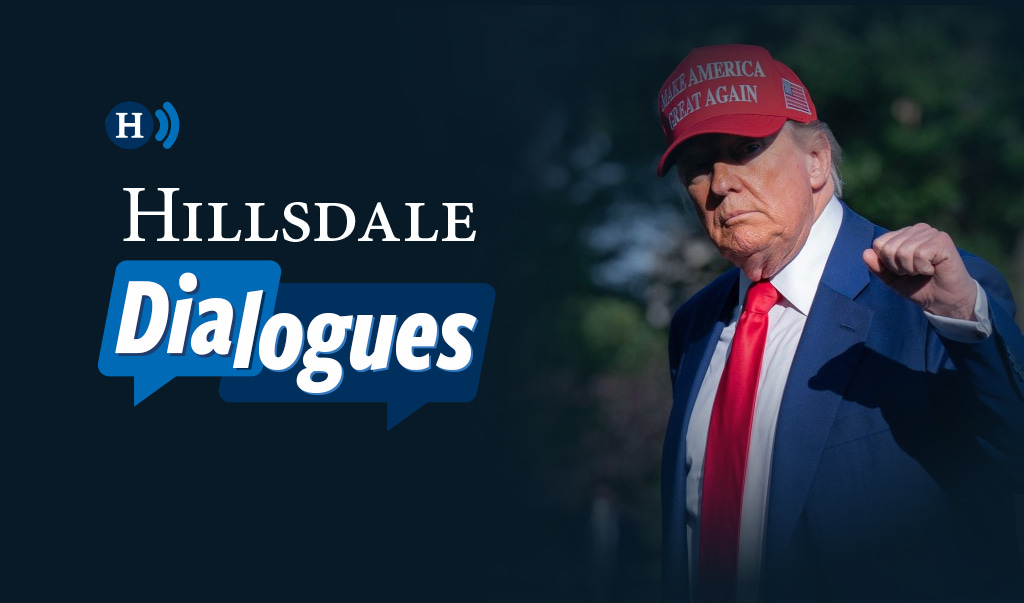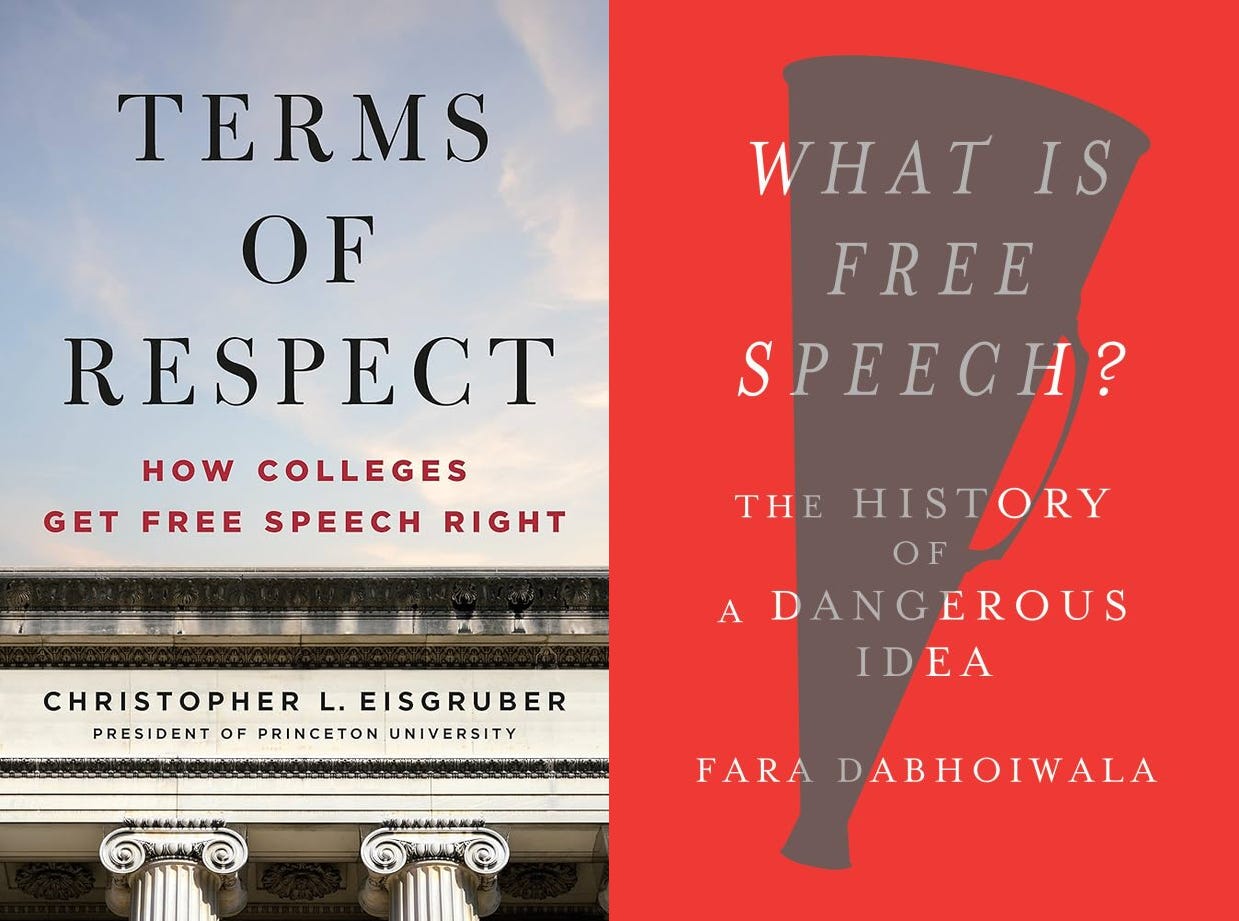Targeting truth in Trump times
First Amendment News 488

The ideal notwithstanding, truth does not always stand a chance in the political marketplace.
Holmes knew that, even as he preached his First Amendment gospel. Difficult as that Miltonian aspirational hope is to realize, it becomes even more difficult when the president calls the shots, when he or his subordinates dictate the contents and contours of truth.
To impose one’s will on time, on people, or on history is a sign of tyranny, of an imperious order to make reality conform to one’s ideology or personal whim. By that measure, greatness is defined by a false sense of reality, one beholden to a grandiose sense of the State and/or the self.
That mindset is willfully oblivious to the workings of the true world and the real sufferings of those either dead or alive. It is rooted in the claim to greatness, that “exceptional” state of affairs by which the default position is superiority, free of any wrongdoings other than those rare few that are rationalized away.
Even the scars of racism are to be erased from the pages of history in Trump times.
In the deceptive process, facts fade, truth vanishes, and the past is reconfigured to suit the will of the leader and his followers. After all, that is the popular mandate, or so we are told, which calls to mind something Hermann Göring (then president of the Reichstag) said during his Nuremberg trial: “The victor will always be the judge.”
That is another way of saying that history is written by the victors. By that measure, what we are left with is, in Robert Chenavier’s words, a “history of sovereignty.”
Think of that: the link between sovereignty and how history is recorded. To be sovereign is to be supreme, and that supremacy governs how the events of the past are to be portrayed.
In TRUMP truth that translates to the “exceptional” qualities of the supreme leader and the “exceptional” character of his nation as he demands that it be redefined. Take heed! Trump is great; America is great; both are exceptionally so — no contrary truths will be tolerated.
The formula
It is simple: Advocate one thing (e.g., “restoring freedom of speech”), practice another (e.g., networks critical of Trump should have their licenses “taken away”). It’s an Orwellian formula with a Trump twist, reminiscent of those who champion “the flat Earth theory.” That 21st-century pseudoscientific belief portends that the Earth is a flat disc, rather than a sphere. Of course, truth is subjective such that sometimes even authentic science must be bum-rushed out the door in the name of ideological conformity. By such truth-denying standards, even neo-Nazis count as “very fine people.” That, at least, is the Trump gospel. In the process, everything is relative, both as a moral principle and a scientific fact.
What is not relative or subject to fact-based reproach is anything that casts the Supreme Leader or the Exceptional State in a negative light. That is where we are when it comes to education, libraries, and museums, among others. After all, we live in Trump times.
‘American exceptionalism’
Let us start here to better grasp the problem: “George Washington is the only slave-owing President of the United States who freed his slaves at his death.” So wrote the late American historian David McCullough. Of the 12 presidents who owned or inherited slaves, those who never freed their enslaved people included Thomas Jefferson, James Madison, and John Tyler. Question: Ought such facts be included in public school curricula? For Mr. Trump the answer appears to be “no,” since he views such matters as “corrosive ideology” that leads to the impression that “America is purportedly racist.” This focus on, in Trump’s words, “how bad Slavery was” is the problem.
The answer: We must “celebrate American exceptionalism” and shun “divisive narratives” that expose America’s failings. Such narratives, however true, are portrayed as “improper partisan ideology.” Americans cannot be “exceptional” and Americans cannot revere their heritage when such historical facts are recalled in critical ways.
K-12 ‘1776 Curriculum’
To posit one’s country as an absolute value that cannot be defiled by evil is manifestly absurd.
To help remedy this so-called problem, Hillsdale College President Larry Arnn was tapped to lead a Trump administration commission and to create a K-12 history and civics curriculum that stressed the “unprecedented” nature of American freedom and prosperity, stressing the nation’s strengths rather than its failings. This curriculum was a response to the 1619 Project. (See also Hillsdale College’s commemorative videos to celebrate the 250th anniversary of the Declaration of Independence and its mission to create a “patriotic education”).
Which brings us back to the question of how to understand the Framers and their involvement with or endorsement of slavery, or their silence about it. Here is how that question is answered in the President’s Advisory 1776 Commission Report:
George Washington owned slaves, but came to detest the practice, and wished for “a plan adopted for the abolition of it.” By the end of his life, he freed all the slaves in his family estate. . .
Thomas Jefferson also held slaves, and yet included in his original draft of the Declaration a strong condemnation of slavery, which was removed at the insistence of certain slaveholding delegates. . .
James Madison saw to it at the Constitutional Convention that, even when the Constitution compromised with slavery, it never used the word “slave” to do so.
Notice what is omitted from the factual record: Jefferson and Madison never freed their slaves in their lifetimes. And for all the attention focused on the Declaration of Independence and its exculpatory status, such revealing historical facts are erased.
While there is, of course, some historical truth in what is contained in the Hillsdale College materials, they are sometimes coated in exonerating omissions or overstatements. In that regard, and however one values the majesty of the Declaration or the genius of the Constitution, the fact is that slaves were not freed under the 1788 Constitution and were categorized as: “three fifths” of a person (Art. I, sect. 2, cl. 3). Moreover, there were 77 to 78 years between the ratification of the Constitution and the ratification of the 13th Amendment outlawing slavery.
Whatever the proper and accurate historical balance between what is set out in the 1619 Project and Hillsdale College’s curricular partnership with the Trump administration, it is important to note that the latter is government-approved. Operationally, it is the government deciding how its history is taught to students. And that is the problem, especially when (as with Hillsdale College) the ideological tie between those governing and those rewriting the history is inseparable.
Going forward, one wonders what government pressure might be imposed on public schools to use the Hillsdale College materials.
To return to Weil’s epigraph quote: Patriotism and love of Nation do not depend on a dogmatic and exonerating rendering of our history absolved (or largely so) of its failings. History, honestly told, does not ratchet one way, be it liberal or conservative. Much as political correctness is not the answer, political compulsion or collusion is hardly a salutary alternative.
In the end, what makes America truly “exceptional,” and what will continue to make it more exceptional, are both its accomplishments and its willingness to first recognize its failings and then vow to remedy them.
Related
Clint Smith, “Actually, Slavery Was Very Bad,” The Atlantic (Aug. 22)
“News outlets push back on Pentagon’s new reporting restrictions,” CNN (Sept. 28)
Jeff Mason, Ahmed Aboulenein, and Julie Steenhuysen, “Trump links autism to Tylenol and vaccines, claims not backed by science,” Reuters (Sept. 23)
Barry Schwabsky, “Trump Wants to Make Art Into a Tool of the State,” The Nation (Aug. 22)
Judge rules Mike Lindell’s (the ‘pillow guy’) Smartmatic statements were false
“Judge Rules ‘My Pillow Guy’ Mike Lindell Defamed Smartmatic with False Claims on Voting Machines,” First Amendment Watch (Sept. 29
MyPillow founder Mike Lindell defamed the election technology company Smartmatic with false statements that its voting machines helped rig the 2020 presidential election, a federal judge in Minnesota ruled Friday.
But U.S. District Judge Jeffrey Bryan deferred until future proceedings the question of whether Lindell — one of the country’s most prominent propagators of false claims that the 2020 election was a fraud — acted with the “actual malice” that Smartmatic still needs to prove to collect any damages.
The judge said there are “genuine fact disputes” as to whether Lindell’s statements were made “with knowledge that they were false or made with reckless disregard to their falsity.” He noted that the defense says Lindell has an “unwavering belief” that his statements were truthful.
[. . .]
The judge ruled there were 51 specific times when Lindell falsely claimed — in documentaries he produced and through various media and personal appearances — that Smartmatic interfered with the results.
“The Court concludes that, based on the record presented, no reasonable trier of fact could find that any of the statements at issue are true,” Bryan wrote.
Related
“Rudy Giuliani and Dominion Voting Systems Settle Defamation Suit Over His 2020 Election Claims,” First Amendment Watch (Sept. 29)
Former ABC employees urge network not to be silenced by political pressure
Ted Johnson, “More Than 100 Former ABC News Employees Call On Disney CEO Bob Iger To Make Clear Network ‘Will Not Be Silenced Or Intimidated By Political Pressure’,” Deadline (Sept. 24)
More than 100 former ABC News employees including Sam Donaldson, Tom Bettag and Judy Muller have signed on to a letter urging Disney CEO Bob Iger to step it up when it comes to publicly defending journalists under political attacks and the company itself against government pressure.
“We want to acknowledge and commend your decision to reinstate Jimmy Kimmel’s show,” the ABC News employees wrote in the letter, first reported by CNN. “It was the right call and an important statement that political intimidation should not dictate ABC’s programming. This action reflects the values that have long defined The Walt Disney Company.”
Related:
Corn-Revere testifies before Senate committee on First Amendment and FCC
“Senators Blumenthal and Warren on First Amendment and the FCC,” C-SPAN (Sept. 29)
Statement of Robert Corn-Revere
Chief Counsel, Foundation for Individual Rights and Expression
SPOTLIGHT FORUM ON TRUMP ADMINISTRATION’S ASSAULT ON FREE SPEECH & FREE PRESS
Over the past ten months we have witnessed an extraordinary number of formal and informal assertions of power over the broadcast media and the national broadcast networks. Of course, the most recent example involved Chairman Brendan Carr’s crude threat directed at Disney and its ABC Network to “take action on Kimmel or there is going to be additional work for the FCC ahead.” The ultimatum stemmed from a monologue on Jimmy Kimmel Live! in which the late-night host joked about the possible motives of Charlie Kirk’s assassin.
Chairman Carr’s call to “take action” was followed immediately by ABC’s announcement that it was suspending Kimmel’s show “indefinitely.” Two major station group owners, Nexstar Media Group and Sinclair Broadcast Group, also announced that their ABC-affiliated stations would not carry Jimmy Kimmel Live! because of what they saw as offensive remarks. Kimmel’s show has since been restored to the air, first by the network, and then by both station group owners.
This incident did not occur in a vacuum. Since being elevated to the FCC chairmanship, Carr has revived previously dismissed complaints against the ABC, CBS, and NBC networks for alleged programming violations; slow-rolled approval of a merger between Paramount Global (owner of CBS) and Skydance Media (which has since been granted after the promise of an internal ombudsman to police “news bias” complaints); publicly cheered the demise of The Late Show with Stephen Colbert on CBS (the cancellation of which coincided with the merger approval); and has publicly solicited “news distortion” complaints against network news programs he evidently perceives to be critical of the President or his policies.
Carr has described his actions as business as usual for the FCC. He has said that broadcasters are licensed under the Communications Act to serve the “public interest,” and that he is merely holding them to that commitment. He has pointed to FCC policies against “news distortion” and “broadcast hoaxes” and claimed the agency is obligated to act if it receives complaints. And he has asserted that he is merely enforcing policies crafted by his Democratic predecessors, essentially arguing that if authority has been abused in the past, why shouldn’t he do the same?
None of this behavior is normal, authorized by the Communications Act, or permitted by the First Amendment. Just last term, the Supreme Court unanimously reaffirmed that the “‘threat of invoking legal sanctions and other means of coercion ... to achieve the suppression’ of disfavored speech violates the First Amendment.”4 This constitutional rule applies regardless of any authority Chairman Carr may believe the FCC has over broadcast programming. . .
Trump watch
Tim Zick, “Breaking: Judge Rules Trump Administration Violated the First Amendment Rights of Lawfully Resident International Students and Scholars,” Thoughts on the First (Sept. 30)
Today Judge Young issued his post-trial Findings of Fact and Rulings of Law. The document weighs in at a hefty 161 pages…
Tim Zick, “The Trump Administration’s ‘Grand Strategy’ Regarding Universities,” Thoughts on the First (Sept. 29)
Tim Zick, “Antifa, Domestic Terrorism, and Public Protest,” Thoughts on the First (Sept. 25)
The Jimmy Kimmel saga
Sinclair and Nexstar, the two major station groups that preempted “Jimmy Kimmel Live!” earlier this month, have backed down, ending their boycott and allowing the show to return to their ABC-affiliated stations. The reversal is a victory for Kimmel and ABC and a reflection of the power that national networks have over local affiliates.
Ariel Zilber, “Over 1.7M users cancelled Disney+, Hulu and ESPN subscriptions following Jimmy Kimmel suspension,” New York Post (Sept. 30)
Jeremy Barr, “FCC chair claims he never threatened TV networks over Jimmy Kimmel,” The Guardian (Sept. 30)
Brendan Morrow, “Jimmy Kimmel fires back at JD Vance over ‘fairytale’ comments about his suspension,” USA Today (Sept. 30)
Dominic Patten, “Kimmel Corporate Fallout Continues: Irate Shareholders Have Nothing Yet From Disney About Suspension; Legal Threat Looms With Tuesday Expiration Date For Documents,” Deadline (Sept. 29)
Brendan Morrow, “David Letterman says Kimmel suspension will lead to ‘something from which we won’t recover’,” USA Today (Sept. 19)
Louis Menand reviews two new books on free speech
Louis Menand, “Where the Battle Over Free Speech is Leading Us,” The New Yorker (Sept. 26)
The United States is in a speech war. Normally, human beings fight over money or land or love, but that is not what is happening today. Today, people are fighting over words. People’s lives are being damaged and sometimes destroyed not for something they did but for something they said. We live in a society of doxing, trolling, cancelling, sanctioning, slandering, deplatforming, defunding, persecuting, prosecuting, firing, and sometimes killing over the expression of an opinion. A big part of the craziness is that some of the people going to war over words are casting themselves as champions of free speech. It’s the people they are trying to silence, they claim, who are the enemies.
[. . .]
Christopher L. Eisgruber’s new book, “Terms of Respect: How Colleges Get Free Speech Right” (Basic), is not ideally timed. Eisgruber is the president of Princeton University. It is a truth universally acknowledged that university presidents should not write books about their own schools, to which they have a fiduciary duty. The terms of their tenure require that they not do or say anything that might damage the school’s reputation or fundraising capacity. It is therefore impossible for them to comment disinterestedly or openly on topics bearing on their own institutions.
Within the self-censoring limits of the genre, Eisgruber has sensible things to say, maybe too sensible. His main practical point is that, as he puts it, “speech must be both uncensored and regulated.” This seems to mean that we should be in favor of what are called “time, place, and manner” restrictions on campus speech—no chanting in the library, no bullhorns in the quad, and so on. Fair enough. There are all kinds of things you cannot lawfully do in public spaces. The problems arise when you try to draw the line of permissibility, and Eisgruber doesn’t help us much here. His own reactions to speech controversies at Princeton, as he relates them, seem to have been largely seat-of-the-pants. And, so far, reasonably successful.
[. . .]
Fara Dabhoiwala teaches in the history department at Princeton, but he was not a signatory to the petition. Which is surprising, since his new book, “What Is Free Speech? The History of a Dangerous Idea” (Belknap), is entirely in its spirit. (Although it is a good rule never to sign a letter you did not write. You will be responsible for every word.) When we see “a dangerous idea” in the subtitle, we naturally assume that Dabhoiwala means dangerously good, in the sense of dangerous to bullies and tyrants. But this is not what he means. He means that free speech is a bad idea. Eisgruber thinks that the maximalist character of American free-speech law is the best thing about it, but Dabhoiwala thinks it’s the worst.
When we think of the history of free-speech rights, we tend to think of the Anglo-American legal tradition. A virtue of Dabhoiwala’s book is that it is transnational, and there are discussions of free-speech traditions less familiar to American readers. The first free-speech law, for example, was enacted in Sweden, in 1766.
The point Dabhoiwala wants to make is that the Anglo-American concept is not universal. On the contrary, he says, “America is now the only country in the world where even local ordinances against ‘hate speech’ are treated as presumptively unconstitutional.” First Amendment jurisprudence is absolutist and libertarian. Other nations have speech rights, but they are qualified. Hate speech can be prosecuted in the United Kingdom.
For a historian, Dabhoiwala is rather judgy. He calls free speech “a kind of secular religion, with its own shifting dogmas and hagiography,” an “inherently unstable fiction,” and “a contrived, invented concept.” Of course, all our concepts are invented. They are tools for dealing with the world, which happens to include a lot of other human beings, many of whom, sadly, don’t agree with us. [. . . .]
So to Speak podcast on the FCC
“What is going on with the FCC?” So to Speak (Sept. 30)
What is the Federal Communications Commission, and why does its chairman think the agency can regulate Jimmy Kimmel’s jokes?
Note: Shortly after recording this episode, Nexstar and Sinclair announced they would return “Jimmy Kimmel Live!” to their stations.
Joining us:
Anna Gomez, FCC Commissioner
Ronnie London, FIRE General Counsel
Bob Corn-Revere, FIRE Chief Counsel
More in the news
“In Landmark Ruling, Federal Court Says Trump Administration Violated First Amendment By Arresting, Attempting to Deport Foreign Citizens for Pro-Palestinian Advocacy,” Knight First Amendment Institute (Sept. 30)
Colleen Slevin, “Elections worker who lost job after telling Jon Stewart about safety fears settles lawsuit,” Free Speech Center (Sept. 30)
Sean Murphy, “Online threats of violence lead to arrests after Charlie Kirk’s killing,” Free Speech Center (Sept. 29)
Graylan Scott Hagler, “The First Amendment as a Racist Weapon,” CounterPunch (Sept. 29)
Dan Plante, “Federal court rules San Diego yoga classes are free speech,” Fox 5 (Sept. 29)
“Delaware Strengthens Free Speech Protections with Passage of Uniform Public Expression Protection Act,” Institute for Free Speech (Sept. 15)
2024-2025 SCOTUS term: Free expression and related cases
Cases decided
Villarreal v. Alaniz (Petition granted. Judgment vacated and case remanded for further consideration in light of Gonzalez v. Trevino, 602 U. S. ___ (2024) (per curiam))
Murphy v. Schmitt (“The petition for a writ of certiorari is granted. The judgment is vacated, and the case is remanded to the United States Court of Appeals for the Eighth Circuit for further consideration in light of Gonzalez v. Trevino, 602 U. S. ___ (2024) (per curiam).”)
TikTok Inc. and ByteDance Ltd v. Garland (9-0: The challenged provisions of the Protecting Americans from Foreign Adversary Controlled Applications Act do not violate petitioners’ First Amendment rights.)
Cases for next term
Pending petitions
Petitions denied
MacRae v. Mattos (Thomas, J., special opinion)
L.M. v. Town of Middleborough (Thomas, J. dissenting, Alito, J., dissenting)
No on E, San Franciscans Opposing the Affordable Care Housing Production Act, et al. v. Chiu
Emergency applications
David Yost, Attorney General of Ohio, Applicant v. Cynthia Brown, et al. (Ohio, case No. 2:24-cv-1401, is hereby stayed pending further order of the undersigned order of the Court. It is further ordered that a response to the application be filed on or before Wednesday, April 16, 2025, by 5 p.m. (EDT).)
Free speech-related
Mahmoud v. Taylor (argued April 22 / free exercise case: issue: Whether public schools burden parents’ religious exercise when they compel elementary school children to participate in instruction on gender and sexuality against their parents’ religious convictions and without notice or opportunity to opt out.)
Thompson v. United States (decided: 3-21-25/ 9-0 w special concurrences by Alito and Jackson) (interpretation of 18 U. S. C. §1014 re: “false statements”)
Last scheduled FAN
This article is part of First Amendment News, an editorially independent publication edited by Ronald K. L. Collins and hosted by FIRE as part of our mission to educate the public about First Amendment issues. The opinions expressed are those of the article’s author(s) and may not reflect the opinions of FIRE.





